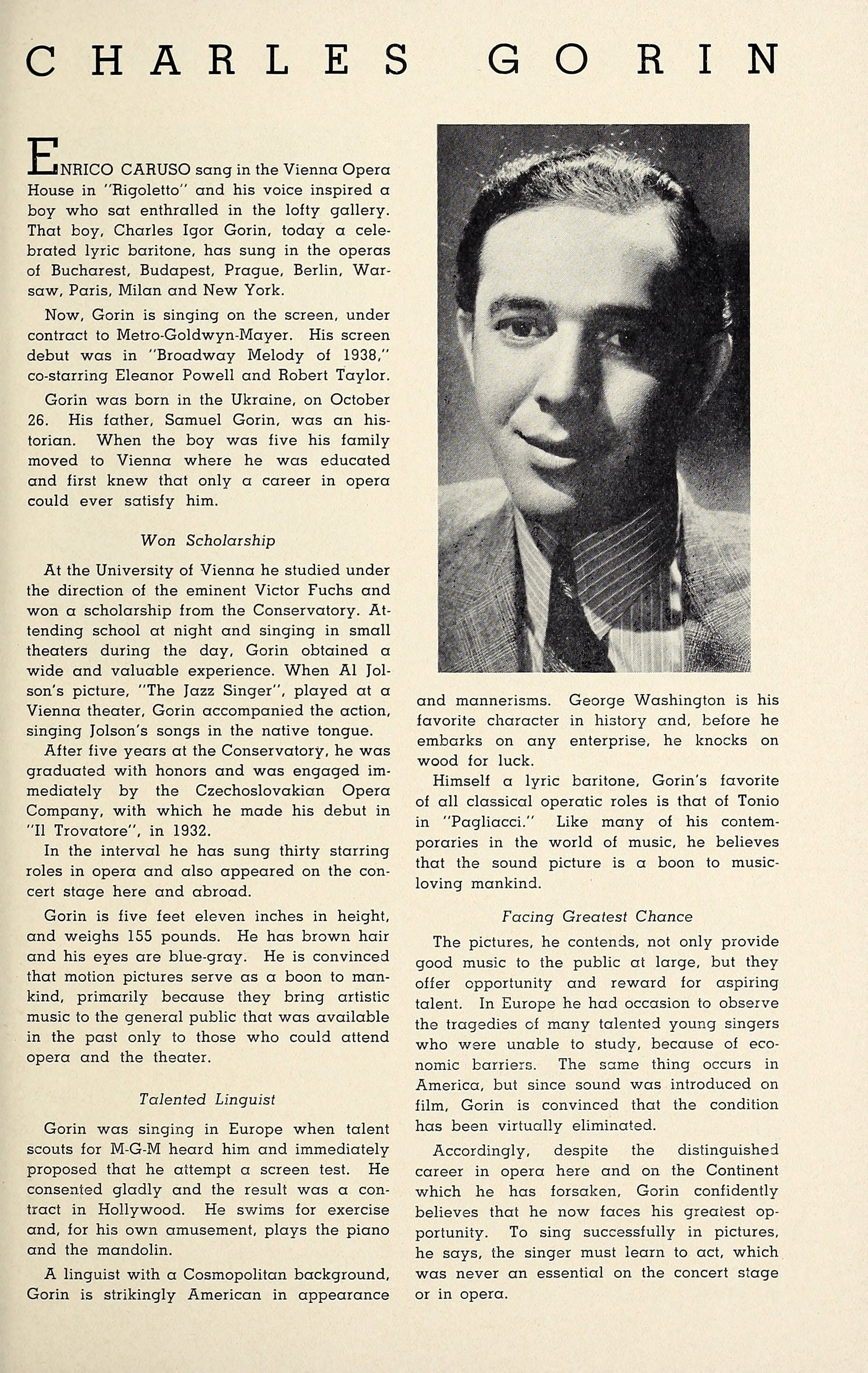Charles Igor Gorin (Who’s Who at MGM, 1937) 🇺🇸

Enrico Caruso sang in the Vienna Opera House in Rigoletto and his voice inspired a boy who sat enthralled in the lofty gallery. That boy, Charles Igor Gorin, today a celebrated lyric baritone, has sung in the operas of Bucharest, Budapest, Prague, Berlin, Warsaw, Paris, Milan and New York.
Now, Gorin is singing on the screen, under contract to Metro-Goldwyn-Mayer. His screen debut was in Broadway Melody of 1938, co-starring Eleanor Powell and Robert Taylor.
Gorin was born in the Ukraine, on October 26. His father, Samuel Gorin, was an historian. When the boy was five his family moved to Vienna where he was educated and first knew that only a career in opera could ever satisfy him.
Won Scholarship
At the University of Vienna he studied under the direction of the eminent Victor Fuchs and won a scholarship from the Conservatory. Attending school at night and singing in small theaters during the day, Gorin obtained a wide and valuable experience. When Al Jolson’s picture, The Jazz Singer, played at a Vienna theater, Gorin accompanied the action, singing Jolson’s songs in the native tongue.
After five years at the Conservatory, he was graduated with honors and was engaged immediately by the Czechoslovakian Opera Company, with which he made his debut in Il Trovatore, in 1932.
In the interval he has sung thirty starring roles in opera and also appeared on the concert stage here and abroad.
Gorin is five feet eleven inches in height, and weighs 155 pounds. He has brown hair and his eyes are blue-gray. He is convinced that motion pictures serve as a boon to mankind, primarily because they bring artistic music to the general public that was available in the past only to those who could attend opera and the theater.
Talented Linguist
Gorin was singing in Europe when talent scouts for M-G-M heard him and immediately proposed that he attempt a screen test. He consented gladly and the result was a contract in Hollywood. He swims for exercise and, for his own amusement, plays the piano and the mandolin.
A linguist with a Cosmopolitan background, Gorin is strikingly American in appearance and mannerisms. George Washington is his favorite character in history and, before he embarks on any enterprise, he knocks on wood for luck.
Himself a lyric baritone, Gorin’s favorite of all classical operatic roles is that of Tonio in Pagliacci. Like many of his contemporaries in the world of music, he believes that the sound picture is a boon to music- loving mankind.
Facing Greatest Chance
The pictures, he contends, not only provide good music to the public at large, but they offer opportunity and reward for aspiring talent. In Europe he had occasion to observe the tragedies of many talented young singers who were unable to study, because of economic barriers. The same thing occurs in America, but since sound was introduced on film, Gorin is convinced that the condition has been virtually eliminated.
Accordingly, despite the distinguished career in opera here and on the Continent which he has forsaken, Gorin confidently believes that he now faces his greatest opportunity. To sing successfully in pictures, he says, the singer must learn to act, which was never an essential on the concert stage or in opera.

Collection: Who’s Who at Metro-Goldwyn-Mayer (1937)
